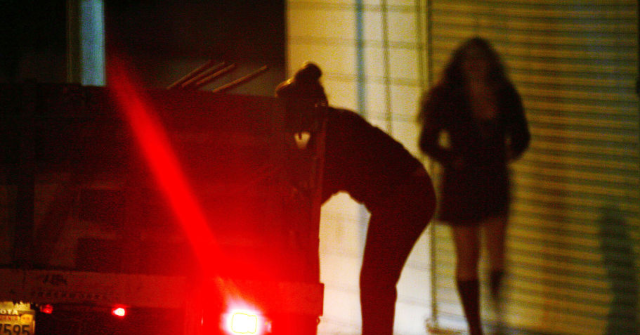The New York Times has shone a spotlight on the Democrats’ long-ignored “kiddie stroll” sex market on Los Angeles’ Figueroa Street, yet the newspaper downplayed the pimp shield law pushed by a libertarian Democratic legislator, Rep Scott Wiener, and signed by California Gov. Gavin Newsom.
“For the 77th Street Division, which covers the northern half of the Figueroa Corridor, prostitution had always been a problem. But in recent years, the officers had seen the magnitude of child sex trafficking explode,” says the article, written by reporter Emily Baumgaertner Nunn.
Gangs that had long sold drugs began to take advantage of Figueroa’s lucrative opportunity. With a dozen girls, one trafficker could easily make $12,000 a night. “Drugs are sold once and gone forever, but girls can be resold indefinitely,” said [police sergeant Alvaro] Navarro, who had been in the division for two decades. Motel owners who noticed the parades of customers but feared the gangs’ retribution kept quiet.
But the Democratic-run state has cut funding for cops and handcuffed their efforts to pull young girls — some aged 12 — from the sex-trafficking street, the newspaper noted:
As trafficking grew, the means to deal with it shrank. In 2021, the Police Department’s central human-trafficking unit was disbanded following budget cuts, leaving each division fewer resources to tackle the problem. According to Navarro, the 77th Street Division was supposed to have six investigators at Armendariz’s rank in its vice unit. Instead, she was the only one.
Their jobs grew even more challenging when California repealed the law allowing the police to arrest women who loitered with the intent to engage in prostitution. The repeal, known as SB 357, was intended to prevent profiling of Black, brown, and trans women based on how they dressed. But when it was implemented in January 2023, the effect was that uniformed officers could no longer apprehend groups of girls in lingerie on Figueroa, hoping to recover minors among them. Now officers needed to be willing to swear they had reason to suspect each girl was underage — but with fake eyelashes and wigs, it was nearly impossible to tell. One girl told vice officers that her trafficker had explained things succinctly: “We run Figueroa now,” he said.
“By the end of 2023, the city attorney had taken to calling Figueroa the Kiddie Stroll because so many of the girls weren’t even 13,” the newspaper wrote.
@nytimes A 50-block stretch of Los Angeles has become one of the most notorious child sex trafficking corridors in the U.S. Our reporter Emily Baumgaertner Nunn rode along with undercover officers trying to rescue the girls and arrest the traffickers. Video by Emily Baumgaertner Nunn, Christina Shaman, Kassie Bracken, Stephanie Swart, June Kim and Christopher Orr/The New York Times #losangeles #figueroastreet
♬ original sound – The New York Times
Gov. Gavin Newsom signed the police handcuff bill after it was pushed by Wiener and his far-left allies, who passed SB357 in 2022.
The newspaper did not mention Newsom or Wiener, or clearly describe the pro-prostitution bill, which was pitched by Wiener as legal support for minorities along with gays and “transgender” people.
The ACLU backed the pro-prostitution bill in clear language:
California’s law that criminalizes loitering with intent to commit prostitution gives law enforcement a tool to harass and discriminate against Black and trans communities, particularly women of color. The Safer Streets for All Act will take away this outdated and subjective Penal Code section 653.22 which has for too long allowed law enforcement to criminalize and harass someone based on the color of their skin, their gender, or how they choose to make a living.
…
These stops are deeply traumatic and have a lasting impact on those who are harassed or arrested. The impact of these encounters with law enforcement reinforces already heightened stigma when someone is arrested for this offense due to the difficulties securing employment and safe housing with an arrest record relating to sex work.
As some of the most marginalized members of our community, sex workers deserve to maintain their livelihood without fear of violence or arrest. SB 357 will move California one step closer to acknowledging sex workers as deserving of full dignity and respect. [Emphasis original.]
But the New York Times did get Wiener’s name out in Nunn’s video about her article:
California State Assembly
The article also did not discuss the impact of President Joe Biden’s pro-migration polices. His policies led to a dramatic rise in international sex trafficking in many states.
The New York Times article produced a strong reaction among readers:
Newsom might help himself if he called in the state’s National Guard out to stop the child-trafficking, noted PR expert Frank Luntz:
Read the full article here


